新概念英语第2册Lesson1 A private conversation 课件(共67张PPT)
文档属性
| 名称 | 新概念英语第2册Lesson1 A private conversation 课件(共67张PPT) |  | |
| 格式 | ppt | ||
| 文件大小 | 19.1MB | ||
| 资源类型 | 试卷 | ||
| 版本资源 | 新概念英语 | ||
| 科目 | 英语 | ||
| 更新时间 | 2021-04-25 15:59:16 | ||
图片预览


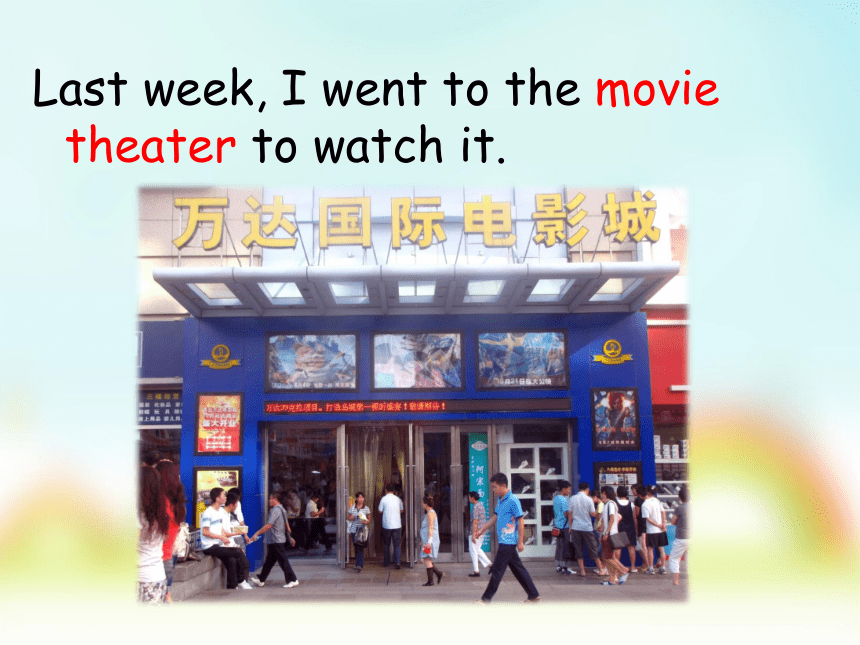
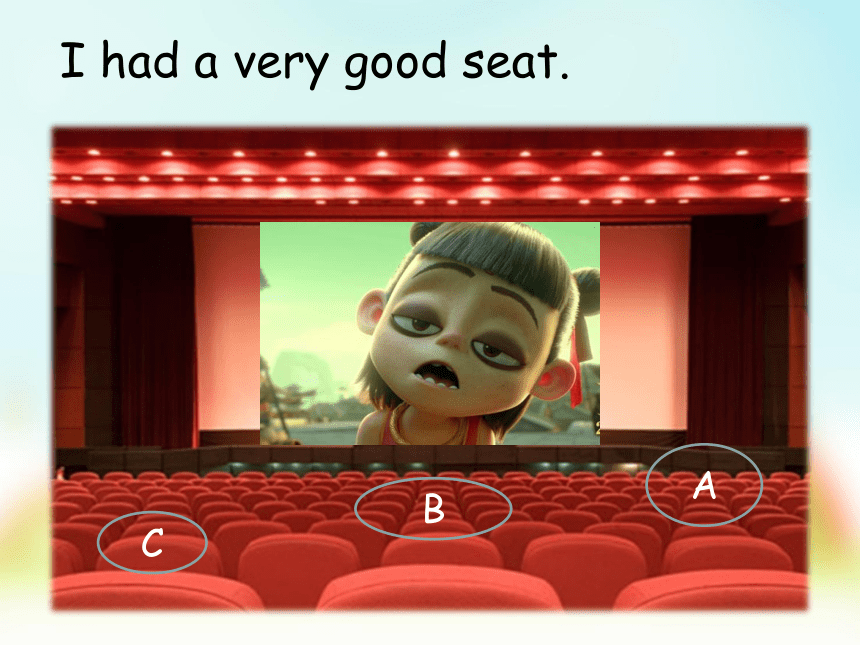

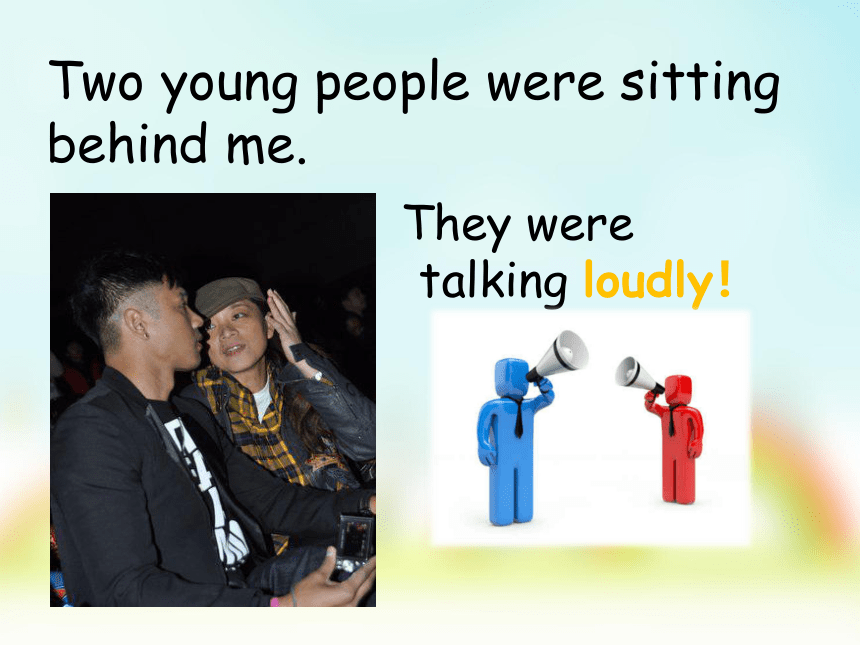
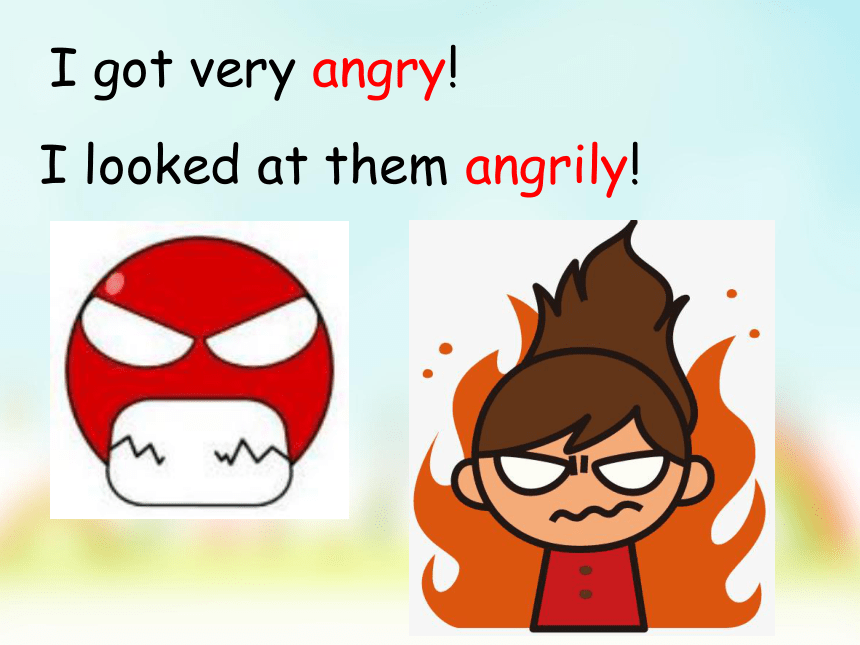

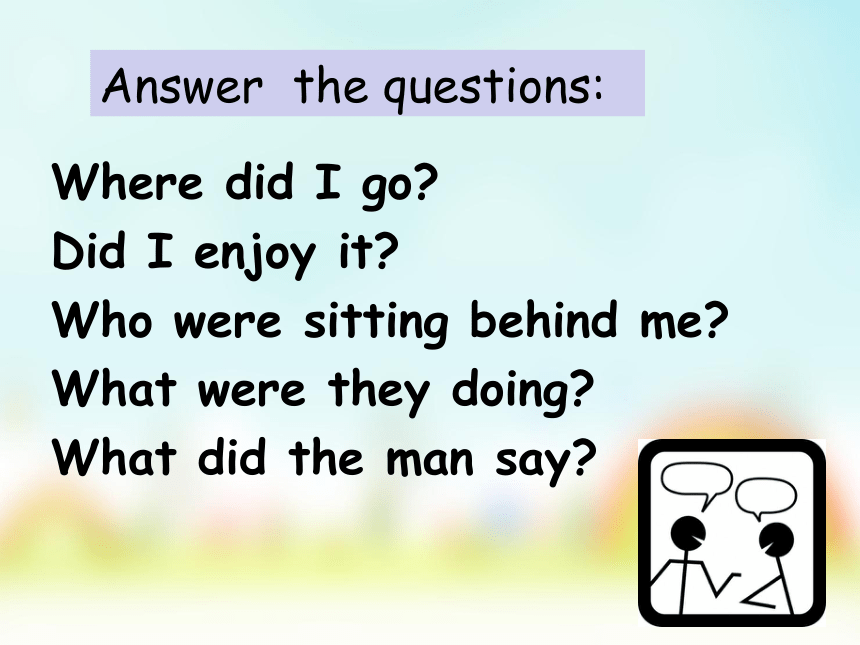
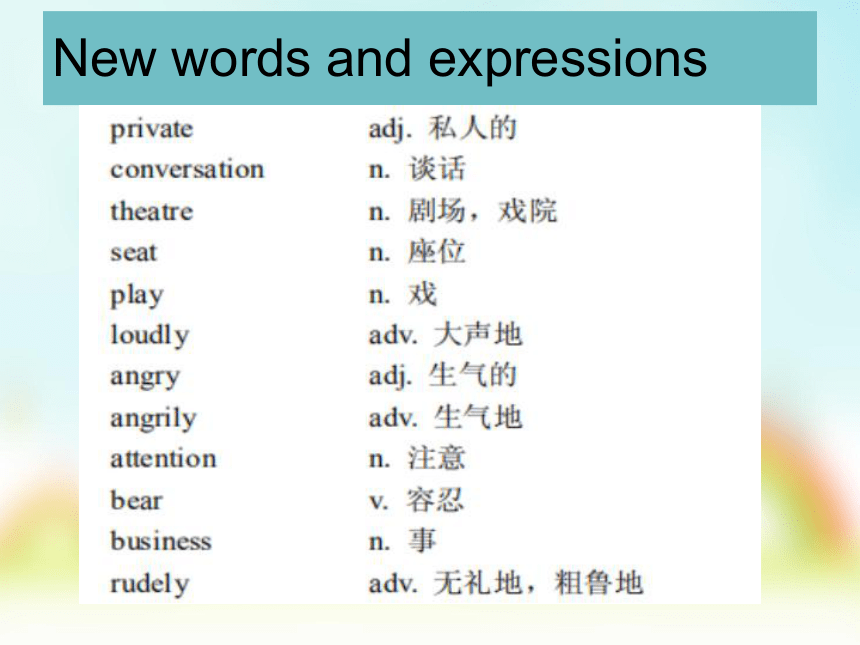

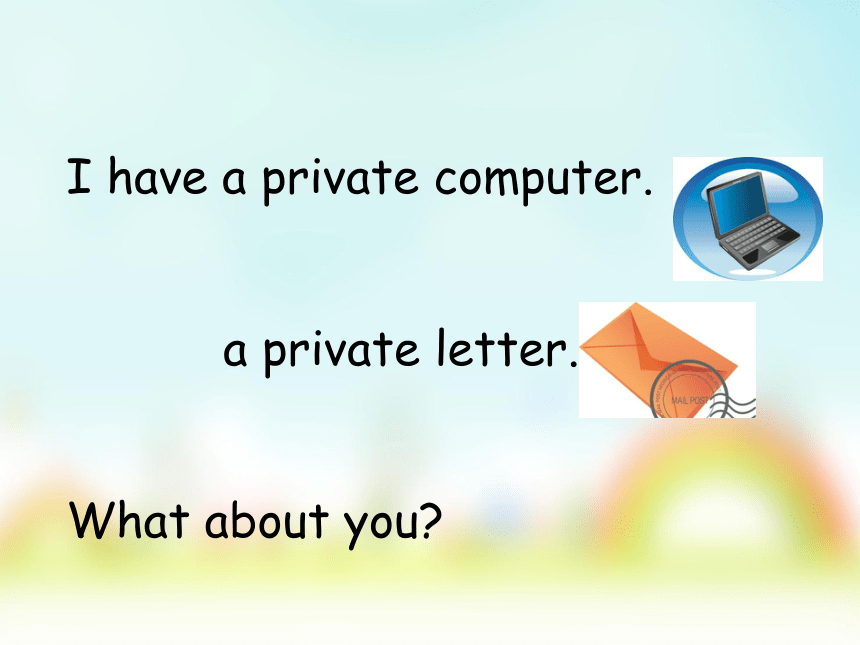
文档简介
(共67张PPT)
新概念第2册-lesson1PPT
Last week, I went to the movie theater to watch it.
I had a very good seat.
C
B
A
The movie was very interesting,
but I did not enjoy it.
Two young people were sitting behind me.
They were talking loudly!
I got very angry!
I looked at them angrily!
It’s none of your business!
Where did I go
Did I enjoy it
Who were sitting behind me
What were they doing
What did the man say
Answer the questions:
New words and expressions
Uncle Zhao
This is my private aircraft.
I have a private computer.
a private letter.
What about you
private [‘praivit] adj.
Let me speak to him _______.
not for the public
private company/ secretary/ school
private conversation
secret
a private place
public
私人的
私密的
私下的
in private
in private
Yoyo studies in a ____________.
private school.
opposite word:
★private adj. 私人的 privacy n.隐私
private school 私立学校
private letter 私人信件
★public adj. 公众的,公开的
public school 公立学校
public place 公众场所
NEW WORDS & EXPRESSIONS
conversation
n. 谈话
con
ver
sa
tion
conversation [,k nv 'sei n]
have a conversation with sb.
与某人谈话
have a conversation about sth.
谈论某事
I’ll __________________ Yoyo her English test.
an informal talk
n. 会话,会谈
have a conversation with
about
★conversation n. 谈话
talk
内容可正式可不正式
conversation
一般用于正式文体中, 内容上往往不正式
Shakespeare’s Globe Theatre
Sydney Opera House
play
talk loudly
theatre
phone
sleep
pay more attention
actors
seat n. sit v.
请坐:
Have/take a seat, please.(口语)
Sit down, please. (上级对下级)
attention [ 'ten n] n.
pay attention to sth.
pay more/some/no/little attention
draw/catch the attention of sb.
Tom, you should________________ your pronunciation.
focus on sth.
注意;重视
pay more attention to
play
n. 戏
watch a play
v. 玩儿,演奏
play basketball
play the piano
bear
n. 熊
v.出生
I was born on …
3. v.容忍
I can’t bear you.
受不了你啦!
business ['biznis] n. 生意,商业,交易
do business with sb.
none of one’s business
与某人做生意
不关某人的事
on business
出差
Mr. Smith doesn’t like ________________foreigners.
I’m afraid Linda can’t talk to you right now, because she is___________.
doing business with
on business
loud/loudly/aloud 填空
The children are shouting ________ in the street.
Students, please read the text _______.
loudly
aloud
★ angry adj. 生气的
angrily adv. 生气地
★ rude adj. 粗鲁的
rudely adv. 粗鲁地
△ careful- carefully
△ easy- easily
happy- happily
adj. – adv.
形容词—副词规则
一般直接+ly, 如quickly,sadly;
以辅音+y结尾的,变y为i加ly,
如lazy-lazily, happy-happily;
以ll结尾的,直接加y,如fully
以辅音+le结尾的,变e为y,如:
able-ably, single-singly;
5. 以原音+e结尾的,去e加ly,如true-truly
①形容词变副词有规律,后缀ly加上去。
辅音+y要变“i”,“ll”结尾只加y。
②e结尾,要注意,前为元音要去e。
③要是结尾le,前为元音也得去。
He closed the door________ (rude, rudely)
Linda played with her sister________ (happy, happily)
She did her homework__________ (careful, carefully)
The girl is sleeping____________ (peaceful, peacefully)
The dog is very________ (love, lovely)
rudely
happily
carefully
peacefully
lovely
What did you do last week
Tony says,Last weekend I went to a theater to see a play.
Listen to the text!
Why did Tom complain to the people behind him
1
2
3
4
When
where
What
Why
How
Who
action
Last week I . I had a very . The play was very interesting. I did not enjoy it.
went to the theatre
good seat
Who
what
how
Why
A young man and a young woman were sitting behind me. They were talking loudly. I got very angry. I could not hear the actors.
I turned round. I looked at the man and the woman angrily. They did not pay any attention. In the end, I could not bear it. I turned round again. 'I can't hear a word!' I said angrily.
two actions
reaction
'It's none of your business,' the young man said rudely. 'This is a private conversation!'
result
misunderstanding
语法
一般过去时
表示过去发生的事情和动作
e.g. I had a very good seat.
More examples in past tense in this story
过去进行时
表示过去某个时间正在发生或进行的动作
e.g. They were talking loudly.
More examples in past progressive tense in this story
一般过去时VS过去进行时
一般过去时
I had a very good seat.
They play was very interesting.
They did not pay any attention.
I could not hear the actors.
过去进行时
A young man and a young woman were sitting behind me.
They were talking loudly.
1. Last week the writer went to the theatre. He was the theatre.
A. to B. at C. into D. on
2. The young man and young woman were sitting behind him. He was sitting them.
A. before B. above C. ahead of D. in front of
3. did the writer feel Angry.
A. Where B. Why C. How D. When
4. He looked at the man and the woman angrily. He looked at angrily.
A. them B. they C. their D. us
5. The young man and the young woman
paid attention to the writer.
A. none B. any C. not any D. no
6. He had a good seat. He was sitting in a good .
A. chair B. place C. armchair D. class
7. The writer looked at the man and the woman angrily. He was very .
A. sad B. unhappy C. cross D. pleased
cross = quite angry, annoyed
8. The writer could not bear it. He could not
it.
carry B. suffer C. stand D. lift
9. The young man spoke rudely. He wasn’t very .
A. Clever B. rude C. polite D. kind
简单陈述句
一个完整的简单陈述句应该包括以下几个部分:
主语 + 谓语 + 宾语或补语 + 方式状语 + 地点状语 + 时间状语(可前置句首)
Q:一个最简单的陈述句至少应包括哪几个部分?
A:一个主语和一个谓语足矣。
I eat. 我吃。
He drinks. 我喝。
I eat and drink.我吃我喝。(并列句)
文中 Last week I went to the theatre. 时间状语 主语 谓语 地点状语
句子结构:
1. 主谓
He smiled.
I walk.
I don’t know.
……
2. 主谓宾
I like apples.
She listened to the news.
I love you.
…
3. 主谓宾宾
She gave him a pen.
My father bought me a little dog.
Linda lent me a book.
…
4. 主谓宾宾补
I find him tired.
We must keep our room clean.
We make them happy.
…
5. 主系表
I am a teacher.
She is beautiful.
We feel tired.
…
常见系动词:
be
keep
stay
remain
seem
appear
prove
turn
grow
get
become
make
主谓宾副地时
Order them!
I drank the milk thirstily
in the dinning room this morning.
I
drank
the milk
thirstily
in the dinning room
this morning.
句型分析:
2. The play was very interesting.
析:主语+系动词+表语
interesting 修饰物
interested 修饰人
3. I did not enjoy it.
析:主语+谓动+宾语
enjoy +doing/sth
句型分析:
4. A young man and a young woman were sitting behind me.They were talking loudly.
析: 过去进行时
结构:主语+was/were+动ing
现在进行时:主语+am/is/are+动ing
句型分析:
5. I got very angry.
析:get angry 系表结构
生某人的气
be angry with sb 表生气的状态
get angry with sb 表生气的过程
I looked at the man and the woman angrily. They did not pay any attention.In the end,I could not bear it.I turned round again.’I can’t hear a word!’I said angrily.
‘It’s none of your business,’the young man said rudely.’ This is a private conversation!’
句型分析:
6. I looked at the man and the woman angrily.
析:look 为不及物动词,+宾语要加at. angrily—副词修饰动词
Please look at me carefully.
句型分析:
7.They did not pay any attention.
析: pay attention to sth/sb
pay no attention to ..没有注意
8.It’s none of your business.
析:固定语法---不关你事!
enjoy 的用法:
① enjoy sth
从sth中得到精神上的娱乐或快乐,比like意义要深得多。
enjoy music享受音乐,
enjoy life享受生活
② enjoy doing
enjoy swimming 喜欢游泳,
enjoy fishing喜爱钓鱼
③ 一般不可说enjoy sb
This morning I enjoyed my English teacher.
但enjoy oneself是个例外!
比如请客人吃菜时:
Enjoy yourself!
本课语法—简单陈述句的语序
主语+谓语动词+宾语+方式状语+地点状语+时间状语
PS:时间状语可以置于开头
eg:I read books carefully in the library yesterday morning.
= Yesterday morning, I read books carefully in the library.
Review
A private conversation
Go to the theatre
Have a seat
Pay attention to
It’s none of your business
adj.—adv.
句子结构
主谓宾副地时
https://www.21cnjy.com/help/help_extract.php
新概念第2册-lesson1PPT
Last week, I went to the movie theater to watch it.
I had a very good seat.
C
B
A
The movie was very interesting,
but I did not enjoy it.
Two young people were sitting behind me.
They were talking loudly!
I got very angry!
I looked at them angrily!
It’s none of your business!
Where did I go
Did I enjoy it
Who were sitting behind me
What were they doing
What did the man say
Answer the questions:
New words and expressions
Uncle Zhao
This is my private aircraft.
I have a private computer.
a private letter.
What about you
private [‘praivit] adj.
Let me speak to him _______.
not for the public
private company/ secretary/ school
private conversation
secret
a private place
public
私人的
私密的
私下的
in private
in private
Yoyo studies in a ____________.
private school.
opposite word:
★private adj. 私人的 privacy n.隐私
private school 私立学校
private letter 私人信件
★public adj. 公众的,公开的
public school 公立学校
public place 公众场所
NEW WORDS & EXPRESSIONS
conversation
n. 谈话
con
ver
sa
tion
conversation [,k nv 'sei n]
have a conversation with sb.
与某人谈话
have a conversation about sth.
谈论某事
I’ll __________________ Yoyo her English test.
an informal talk
n. 会话,会谈
have a conversation with
about
★conversation n. 谈话
talk
内容可正式可不正式
conversation
一般用于正式文体中, 内容上往往不正式
Shakespeare’s Globe Theatre
Sydney Opera House
play
talk loudly
theatre
phone
sleep
pay more attention
actors
seat n. sit v.
请坐:
Have/take a seat, please.(口语)
Sit down, please. (上级对下级)
attention [ 'ten n] n.
pay attention to sth.
pay more/some/no/little attention
draw/catch the attention of sb.
Tom, you should________________ your pronunciation.
focus on sth.
注意;重视
pay more attention to
play
n. 戏
watch a play
v. 玩儿,演奏
play basketball
play the piano
bear
n. 熊
v.出生
I was born on …
3. v.容忍
I can’t bear you.
受不了你啦!
business ['biznis] n. 生意,商业,交易
do business with sb.
none of one’s business
与某人做生意
不关某人的事
on business
出差
Mr. Smith doesn’t like ________________foreigners.
I’m afraid Linda can’t talk to you right now, because she is___________.
doing business with
on business
loud/loudly/aloud 填空
The children are shouting ________ in the street.
Students, please read the text _______.
loudly
aloud
★ angry adj. 生气的
angrily adv. 生气地
★ rude adj. 粗鲁的
rudely adv. 粗鲁地
△ careful- carefully
△ easy- easily
happy- happily
adj. – adv.
形容词—副词规则
一般直接+ly, 如quickly,sadly;
以辅音+y结尾的,变y为i加ly,
如lazy-lazily, happy-happily;
以ll结尾的,直接加y,如fully
以辅音+le结尾的,变e为y,如:
able-ably, single-singly;
5. 以原音+e结尾的,去e加ly,如true-truly
①形容词变副词有规律,后缀ly加上去。
辅音+y要变“i”,“ll”结尾只加y。
②e结尾,要注意,前为元音要去e。
③要是结尾le,前为元音也得去。
He closed the door________ (rude, rudely)
Linda played with her sister________ (happy, happily)
She did her homework__________ (careful, carefully)
The girl is sleeping____________ (peaceful, peacefully)
The dog is very________ (love, lovely)
rudely
happily
carefully
peacefully
lovely
What did you do last week
Tony says,Last weekend I went to a theater to see a play.
Listen to the text!
Why did Tom complain to the people behind him
1
2
3
4
When
where
What
Why
How
Who
action
Last week I . I had a very . The play was very interesting. I did not enjoy it.
went to the theatre
good seat
Who
what
how
Why
A young man and a young woman were sitting behind me. They were talking loudly. I got very angry. I could not hear the actors.
I turned round. I looked at the man and the woman angrily. They did not pay any attention. In the end, I could not bear it. I turned round again. 'I can't hear a word!' I said angrily.
two actions
reaction
'It's none of your business,' the young man said rudely. 'This is a private conversation!'
result
misunderstanding
语法
一般过去时
表示过去发生的事情和动作
e.g. I had a very good seat.
More examples in past tense in this story
过去进行时
表示过去某个时间正在发生或进行的动作
e.g. They were talking loudly.
More examples in past progressive tense in this story
一般过去时VS过去进行时
一般过去时
I had a very good seat.
They play was very interesting.
They did not pay any attention.
I could not hear the actors.
过去进行时
A young man and a young woman were sitting behind me.
They were talking loudly.
1. Last week the writer went to the theatre. He was the theatre.
A. to B. at C. into D. on
2. The young man and young woman were sitting behind him. He was sitting them.
A. before B. above C. ahead of D. in front of
3. did the writer feel Angry.
A. Where B. Why C. How D. When
4. He looked at the man and the woman angrily. He looked at angrily.
A. them B. they C. their D. us
5. The young man and the young woman
paid attention to the writer.
A. none B. any C. not any D. no
6. He had a good seat. He was sitting in a good .
A. chair B. place C. armchair D. class
7. The writer looked at the man and the woman angrily. He was very .
A. sad B. unhappy C. cross D. pleased
cross = quite angry, annoyed
8. The writer could not bear it. He could not
it.
carry B. suffer C. stand D. lift
9. The young man spoke rudely. He wasn’t very .
A. Clever B. rude C. polite D. kind
简单陈述句
一个完整的简单陈述句应该包括以下几个部分:
主语 + 谓语 + 宾语或补语 + 方式状语 + 地点状语 + 时间状语(可前置句首)
Q:一个最简单的陈述句至少应包括哪几个部分?
A:一个主语和一个谓语足矣。
I eat. 我吃。
He drinks. 我喝。
I eat and drink.我吃我喝。(并列句)
文中 Last week I went to the theatre. 时间状语 主语 谓语 地点状语
句子结构:
1. 主谓
He smiled.
I walk.
I don’t know.
……
2. 主谓宾
I like apples.
She listened to the news.
I love you.
…
3. 主谓宾宾
She gave him a pen.
My father bought me a little dog.
Linda lent me a book.
…
4. 主谓宾宾补
I find him tired.
We must keep our room clean.
We make them happy.
…
5. 主系表
I am a teacher.
She is beautiful.
We feel tired.
…
常见系动词:
be
keep
stay
remain
seem
appear
prove
turn
grow
get
become
make
主谓宾副地时
Order them!
I drank the milk thirstily
in the dinning room this morning.
I
drank
the milk
thirstily
in the dinning room
this morning.
句型分析:
2. The play was very interesting.
析:主语+系动词+表语
interesting 修饰物
interested 修饰人
3. I did not enjoy it.
析:主语+谓动+宾语
enjoy +doing/sth
句型分析:
4. A young man and a young woman were sitting behind me.They were talking loudly.
析: 过去进行时
结构:主语+was/were+动ing
现在进行时:主语+am/is/are+动ing
句型分析:
5. I got very angry.
析:get angry 系表结构
生某人的气
be angry with sb 表生气的状态
get angry with sb 表生气的过程
I looked at the man and the woman angrily. They did not pay any attention.In the end,I could not bear it.I turned round again.’I can’t hear a word!’I said angrily.
‘It’s none of your business,’the young man said rudely.’ This is a private conversation!’
句型分析:
6. I looked at the man and the woman angrily.
析:look 为不及物动词,+宾语要加at. angrily—副词修饰动词
Please look at me carefully.
句型分析:
7.They did not pay any attention.
析: pay attention to sth/sb
pay no attention to ..没有注意
8.It’s none of your business.
析:固定语法---不关你事!
enjoy 的用法:
① enjoy sth
从sth中得到精神上的娱乐或快乐,比like意义要深得多。
enjoy music享受音乐,
enjoy life享受生活
② enjoy doing
enjoy swimming 喜欢游泳,
enjoy fishing喜爱钓鱼
③ 一般不可说enjoy sb
This morning I enjoyed my English teacher.
但enjoy oneself是个例外!
比如请客人吃菜时:
Enjoy yourself!
本课语法—简单陈述句的语序
主语+谓语动词+宾语+方式状语+地点状语+时间状语
PS:时间状语可以置于开头
eg:I read books carefully in the library yesterday morning.
= Yesterday morning, I read books carefully in the library.
Review
A private conversation
Go to the theatre
Have a seat
Pay attention to
It’s none of your business
adj.—adv.
句子结构
主谓宾副地时
https://www.21cnjy.com/help/help_extract.php
同课章节目录
